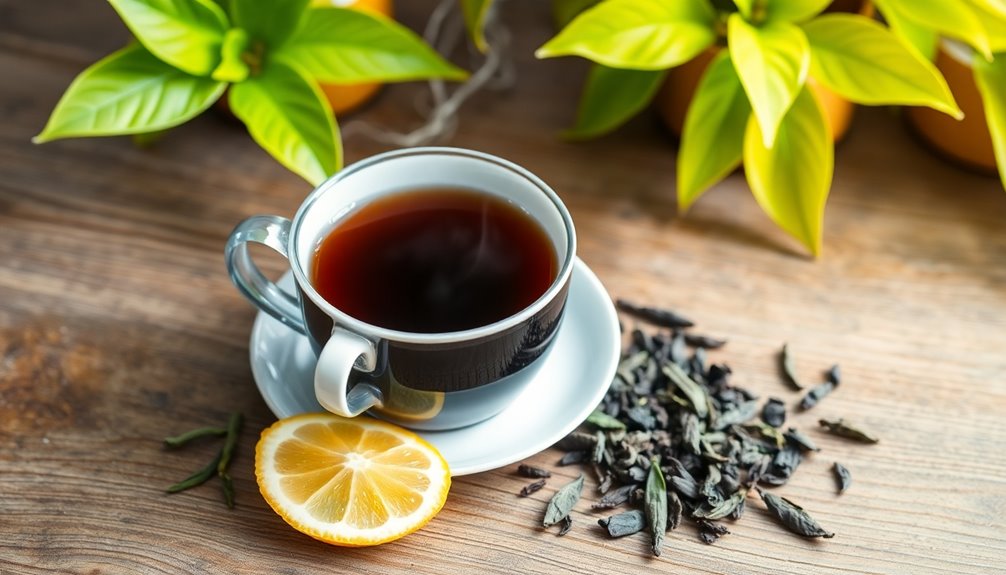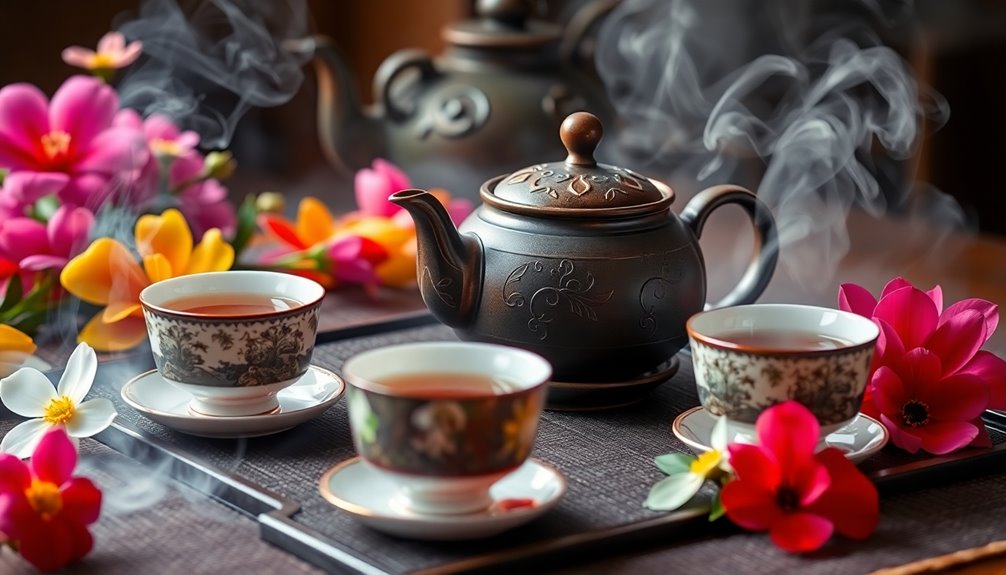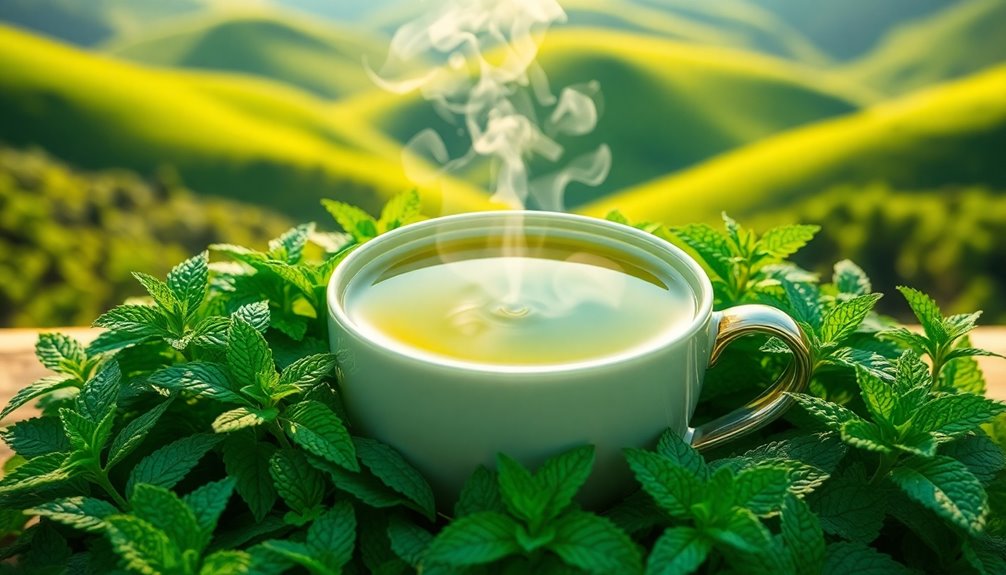Drinking black tea daily brings a bunch of health perks you won't want to miss! It's rich in antioxidants called polyphenols, which help fight off bad stuff in your body. Having a few cups can lower your risk of heart disease and help keep your cholesterol in check. The caffeine and L-theanine work together to boost your brain power, making it easier to focus. Plus, black tea can help manage blood sugar and support a happy gut. With these amazing benefits, you'll want to sip a cup every day! Stick around to discover even more exciting facts!
Key Takeaways
- Drinking black tea daily boosts antioxidant levels, reducing oxidative stress and lowering chronic disease risk.
- Regular consumption can lower heart disease risk by about 4% per cup.
- Black tea enhances cognitive function and mood through its caffeine and L-theanine content.
- The polyphenols in black tea support gut health and improve insulin sensitivity.
- Cultural practices surrounding black tea promote social bonding and community well-being.
Introduction

Drinking black tea can be a simple yet effective way to boost your health. This popular beverage, made from the leaves of the Camellia sinensis plant, is packed with health benefits. One of the key advantages of black tea is its rich content of antioxidants, especially polyphenols. These powerful compounds help combat oxidative stress and reduce cell damage in your body.
When you enjoy black tea regularly, you might experience better cardiovascular health. Studies suggest that each cup can lower your heart disease risk by about 4%. This drink can also help reduce your LDL cholesterol levels, which is important for keeping your heart healthy.
But that's not all! Drinking black tea can enhance your cognitive function too. The caffeine and L-theanine found in black tea boost your alertness and focus, which can be helpful for studying or working.
Additionally, it can help regulate your blood sugar levels and improve insulin sensitivity, making it a great choice for those managing type 2 diabetes.
Rich in Flavonoids

Black tea stands out not only for its rich flavor but also for its impressive array of flavonoids, powerful antioxidants that play a significant role in promoting health.
When you drink black tea, you're not just enjoying a warm beverage; you're also benefiting from these amazing compounds. Flavonoids, like theaflavins and thearubigins, help combat oxidative stress and free radicals in your body.
Regular consumption of black tea can improve your heart health by helping to lower cholesterol levels. Studies show that drinking three or more cups a day can reduce the risk of coronary heart disease by about 4% for each cup you sip. These flavonoids promote healthy blood vessel function, which supports overall cardiovascular health and circulation. Additionally, similar to coffee, flavonoids in black tea may also contribute to improved cognitive function and mood enhancement. Furthermore, black tea is one of the most popular types of tea globally, making it a major contributor to the tea industry's market share.
Rich in Polyphenols

There's no denying that black tea is a powerhouse of polyphenols, which make up about 30% of its dry weight. These amazing compounds act as powerful antioxidants, helping your body combat free radicals. By drinking black tea regularly, you're getting a steady supply of polyphenols that can improve your overall health and reduce the risk of chronic diseases like heart disease and certain cancers.
The main polyphenols in black tea, such as catechins, theaflavins, and thearubigins, play a big role in these health benefits. Studies show that if you drink three or more cups of black tea daily, you can see significant improvements in your antioxidant levels. This boost supports your health and helps keep your body strong.
Additionally, the polyphenolic compounds in black tea promote the growth of beneficial gut bacteria. This is great news for your digestive health and gut immunity!
So, next time you sip on your favorite black tea, remember that you're not just enjoying a delicious drink; you're also taking a step towards better health and well-being.
Cultural Significance in Rituals

Tea isn't just a source of health benefits; it also holds deep cultural significance in various rituals around the world.
For instance, in China, the traditional tea ceremony highlights respect and harmony, showing how important black tea is in their culture. In England, you might enjoy afternoon tea, a delightful social ritual where people gather over black tea and light snacks, fostering community and relaxation.
In Japan, serving black tea during formal gatherings symbolizes hospitality and shows respect for guests. This practice strengthens interpersonal connections and makes everyone feel valued.
Similarly, in India, the ritual of chai combines black tea with spices and milk, making it not just a drink but a means for family bonding and cultural expression.
In many Middle Eastern countries, offering black tea is a customary gesture of hospitality, reflecting warmth and generosity towards guests.
These rituals, centered around black tea, create special moments for bonding and connection, reminding us of the importance of gathering together and sharing experiences.
Caffeine Sensitivity in Individuals

Caffeine sensitivity can significantly impact how individuals experience the effects of black tea. If you're sensitive to caffeine, even moderate consumption of black tea, which contains about 40-70 mg of caffeine per cup, can lead to symptoms like increased heart rate, anxiety, and insomnia.
This sensitivity varies due to genetic factors, meaning some people metabolize caffeine slowly and feel stronger effects.
If you notice discomfort after drinking black tea, you might want to limit your intake to one cup a day or consider trying decaffeinated versions. This can help you avoid those pesky adverse effects.
Keep in mind that symptoms can appear at doses as low as 100 mg, so consuming two to three cups of black tea could trigger reactions if you're caffeine-sensitive.
While regular consumption of caffeinated beverages can build tolerance, individuals with caffeine sensitivity may still feel discomfort, even with gradual increases in their intake.
Listening to your body is essential. If you love black tea but struggle with caffeine sensitivity, experimenting with your consumption can lead to a more enjoyable experience!
Practical Applications

For those who enjoy the taste of black tea but are mindful of caffeine sensitivity, there are still plenty of ways to reap its benefits. Drinking three cups of black tea daily can support your cardiovascular health by reducing heart disease risk and lowering LDL cholesterol levels.
You might also notice improvements in your cognitive function, as the caffeine and L-theanine in black tea help increase alertness and focus.
If you're looking to manage your blood sugar, black tea can be a great addition. It's linked to better blood sugar regulation and improved insulin sensitivity, which can be helpful for managing type 2 diabetes.
Plus, the polyphenols in black tea promote gut health by encouraging the growth of beneficial bacteria, supporting your digestive system.
Incorporating black tea into your daily routine can also help with weight management. Studies indicate that it may assist in reducing body fat and boosting metabolism. Additionally, black tea contains polyphenols that have been shown to enhance metabolic rate and fat oxidation during exercise.
Frequently Asked Questions
What Happens if We Drink Black Tea Daily?
If you drink black tea daily, you might notice improved heart health, lower cholesterol levels, and better blood pressure. You could also experience enhanced insulin sensitivity, which helps regulate blood sugar and reduces diabetes risk.
Does Black Tea Detox Your Body?
Drinking black tea can support your body's detox processes. Its antioxidants combat oxidative stress, while polyphenols promote gut health. However, it shouldn't replace a balanced diet and healthy lifestyle for effective detoxification.
What Is the Best Time to Drink Black Tea?
The best time to drink black tea is in the morning to boost alertness and after meals for digestion. Avoid it close to bedtime to prevent sleep disruption, and wait an hour post-meal for optimal benefits.
Is Black Tea Good for Your Kidneys?
Black tea can be safe for your kidneys if consumed in moderation. You should aim for about 3-4 cups daily, ensuring you stay hydrated to counteract any potential diuretic effects from the caffeine.
Conclusion
Drinking black tea daily can be a tasty way to boost your health! It's packed with flavonoids and polyphenols that help support your heart and overall wellness. Plus, enjoying a cup can connect you to rich cultural traditions. Just keep your caffeine sensitivity in mind. So, whether you sip it in the morning or enjoy it in the afternoon, make black tea a part of your daily routine for a delicious health boost!










